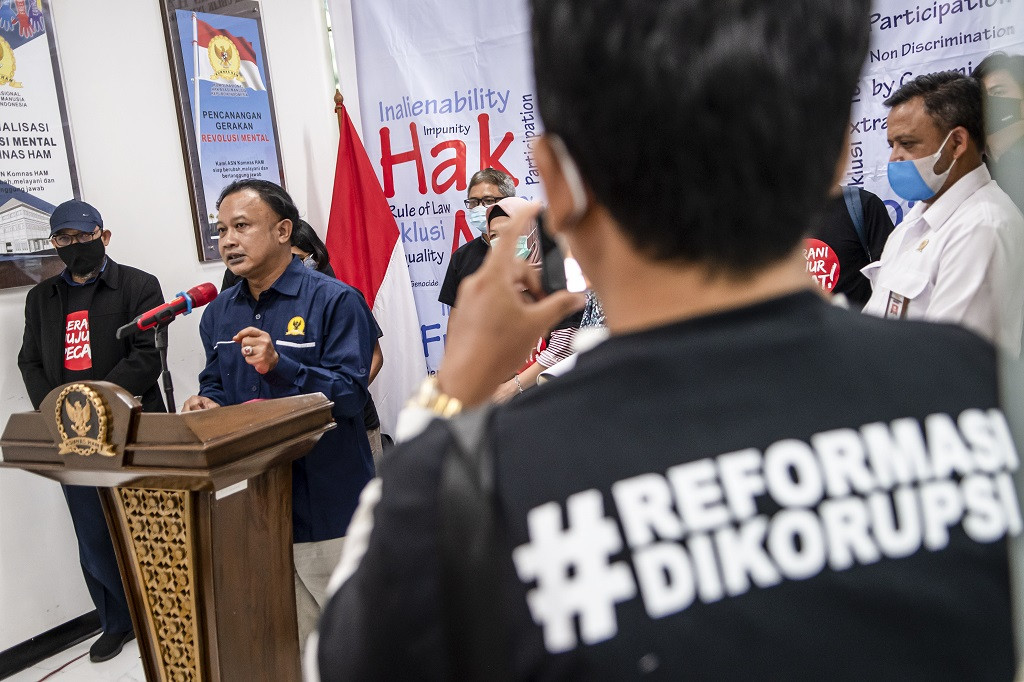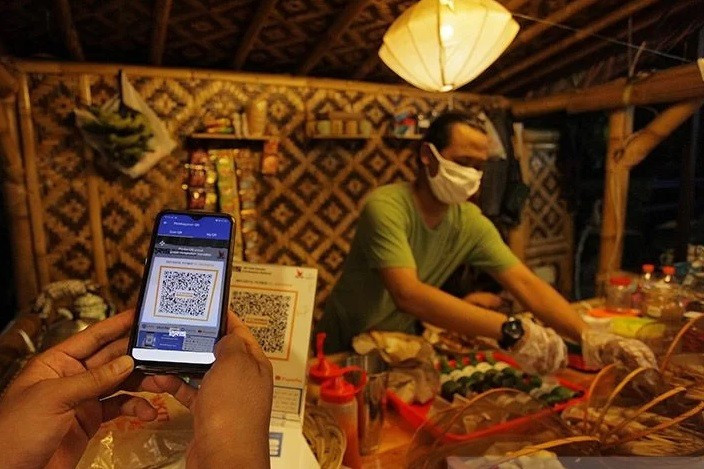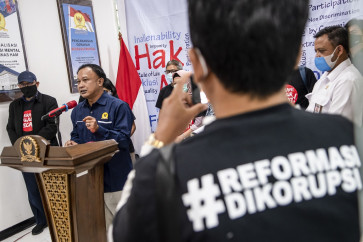Popular Reads
Top Results
Can't find what you're looking for?
View all search resultsPopular Reads
Top Results
Can't find what you're looking for?
View all search resultsManaging a new KPK design amid low public trust
The KPK does not act alone in enforcing anticorruption laws but collaborates with other government institutions and law enforcers.
Change text size
Gift Premium Articles
to Anyone
 National Commission on Human Rights (Komnas HAM) commissioner Choirul Anam (second left) talks to journalists in Jakarta on May 24 after receiving a report from senior Corruption Eradication Commission (KPK) investigator Novel Baswedan (left) and other employees pertaining to a civic knowledge test for the antigraft body employees. (Antara/M. Risyal Hidayat)
National Commission on Human Rights (Komnas HAM) commissioner Choirul Anam (second left) talks to journalists in Jakarta on May 24 after receiving a report from senior Corruption Eradication Commission (KPK) investigator Novel Baswedan (left) and other employees pertaining to a civic knowledge test for the antigraft body employees. (Antara/M. Risyal Hidayat)
T
he Jakarta Post articles, namely, “2021 make-or-break year for KPK in restoring trust” (Jan. 5, 2021); "In KPK we trust?" (Sept. 4, 2021); and “Non-active KPK workers pin hopes on Jokowi to settle their status” (Sept. 8, 2021), underlined three key messages. First, the issue of public trust regarding the Corruption Eradication Commission's (KPK) performance, which has stagnated or has not been satisfactory. Second, the issue of the code of ethics violations and behavior of the KPK leadership. Lastly, the debate regarding the KPK employees’ changing status to civil servants, which requires the right formulation.
From those messages, there is one fundamental issue that begs the question of how to manage the KPK as a public institution that will lead the eradication of corruption after the KPK Law revision. To answer it, we should map out the existing foundations that later serve as guidelines to manage the KPK’s new design as mandated by KPK Law No. 19/2019.
The first foundation, Constitutional Court Decision No. 36/2017 confirms that the KPK is an independent state institution, where its position is under the executive branch. Moreover, Constitutional Court Decision No. 70/2019 further reaffirms that the KPK is within the executive power and emphasizes the KPK’s independence.
Thus, as the KPK holds executive power, the KPK does not act alone in enforcing anticorruption laws but collaborates with other government institutions and law enforcers such as the Attorney General's Office (AGO) and the National Police. Consequently, there are also more choices of instruments for prosecuting corruption, or actors involved in the implementation of the National Strategy for Corruption Prevention.
The second foundation relates to Constitutional Court Decision No. 70/2019, which conveys two important points. First, the court revoked the KPK Supervisory Council’s authority regarding the granting of wiretapping, search and seizure permits. This has dismissed public concerns regarding the bureaucratization of pro-justitia authorities. Second, the Constitutional Court's decision has removed any confusion regarding the authority to terminate investigations and prosecutions related to corruption cases by detailing the termination’s requirements. Ideally, this should give some hope that the public can still rely on the KPK in eradicating corruption.
The third foundation is the revocation of the judicial authority of the KPK Supervisory Council by the Constitutional Court through Constitutional Court Decision No. 70/2019. This can be seen as a favorable condition as there is an opportunity for the council to focus and fulfil the task mandated by Article 37B (1) of Law No.19/2019. It is related to the enforcement of the code of ethics for KPK leaders and employees, and the supervision of the KPK's performance.
The fourth foundation is related to Constitutional Court Decision No. 34/2021, which sets the changing status of KPK employees. From the decision, there are basically opportunities to resolve the polemic, namely, on the concurring opinion in Constitutional Court Decision No. 34/2021. The key message stipulates how the transition from employee status to state civil apparatus is a right and legal consequence of the new KPK Law’s enactment. Thus, the transition must occur first, followed by the resolution of other problems and adjustments to the new KPK design. This fact provides an opportunity of resolution through the KPK’s position under the executive power.

















